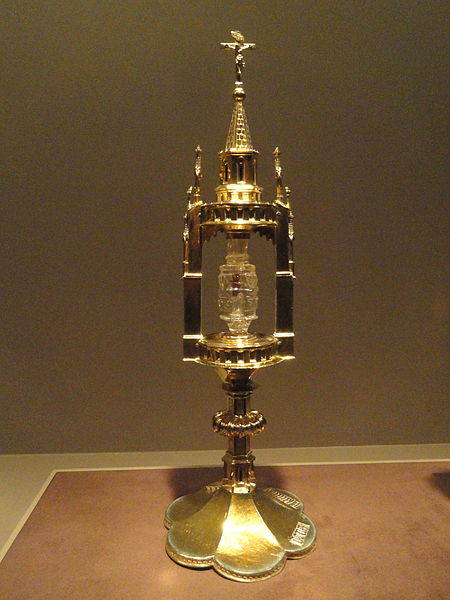I recently tackled the public discussion in Germany about whether to rename the Stiftung Preussischer Kulturbesitz, the foundation that oversees the State Museums of Berlin and some of the most remarkable collections in the world. Readers of the Art Law Report will know this name well, the SPK is the defendant in the lawsuit brought by my clients for the restitution of the Welfenschatz, or Guelphe Treasure, that the Supreme Court heard in 2020. While I've never been shy about criticizing the SPK about its approach in our our case (which is on appeal, briefs here and here), this piece addresses a different question. Namely, what place does the name "Prussia" have in the 21st century? For anyone like me who still thinks about the historical sliding doors of the Grossdeutschelösung and Kleindeutschelösungdebate of the 19th century about how to unite the German-speaking states and duchies, this piece is for you.
Read More
Topics:
Holy Roman Empire,
Prussia,
"Elephant Mural",
Martin Luther,
Stiftung Preussischer Kulturbesitz,
Sueddeutsche Zeitung,
Hermann Goering,
Der Spiegel,
Prussian Cultural Heritage Foundation,
Andy Warhol,
Welfenschatz,
Humboldt Forum,
C. Montgomery Burns,
Claudia Roth,
Siam,
Sigismund of Luxembourg,
Friedrich VI,
Hohenzollern,
Brandenburg,
Kaliningrad,
Augustus II the Strong,
Nefertiti,
Pergamon Altar,
Annalena Bärbock,
Monika Grütters,
Götz Aly,
Joseph Beuys,
Königsberg,
Nazism,
Konrad Adenauer,
Hermann Parzinger,
Luf Boat,
Bild
(WASHINGTON-October 22, 2020) The heirs to the Jewish art dealers who were forced to sell the medieval devotional art collection known as the Welfenschatz (in English, the Guelph Treasure) to agents of Hermann Goering in 1935 filed their brief today in the Supreme Court of the United States. It can be viewed at this link. The Supreme Court is set to hear argument on December 7, 2020, on whether the Foreign Sovereign Immunities Act (FSIA) and its “takings clause” create jurisdiction over the heirs’ claims for restitution of the Welfenschatz—as all reviewing courts so far have held. The Welfenschatz is held by the Stiftung Preussischer Kulturbesitz (in English, the Prussian Cultural Heritage Foundation).
Read More
Topics:
Third Reich,
Gestapo,
Z.M. Hackenbroch,
Prussia,
Germany,
Nazi-looted art,
Foreign Sovereign Immunities Act,
Markus Stoetzel,
Supreme Court,
Mel Urbach,
SPK,
Nuremberg race laws,
Stiftung Preussischer Kulturbesitz,
Hermann Goering,
FSIA,
NS Raubkunst,
Sullivan & Worcester LLP,
J.S. Goldschmidt,
Gerald Stiebel,
Prussian Cultural Heritage Foundation,
Adolf Hitler,
Nicholas M. O'Donnell,
Alan Philipp,
Welfenschatz,
I. Rosenbaum,
Paul Körner,
Wannsee Conference,
Jed Leiber,
House of Brunswick (Braunschweig)-Lüneberg,
Emily Haber,
Wilhelm Stuckart,
Final Solution
The U.S. Court of Appeals for the D.C. Circuit today dismissed the petition to rehear en banc last year’s landmark ruling that the heirs of the art dealers who sold the Guelph Treasure (or Welfenschatz) may pursue their claims in U.S. federal court. Defendants the Federal Republic of Germany and the Stiftung Preussischer Kulturbesitz (the SPK, or Prussian Cultural Heritage Foundation in English) had argued that claims under the Foreign Sovereign Immunities Act’s expropriation exception such as these are not violations of international law and also require a claimant to exhaust remedies abroad, a position rejected by prior decisions of the D.C. Circuit and by today’s ruling as well.
Today’s decision confirms the first-of-its kind holding last year that a German state museum must face claims based on allegations of Nazi-looted art, a direct result of Germany’s failures through its so-called Advisory (often called Limbach) Commission to address seriously and comprehensively the state of Nazi-looted art in its national collections. In the five years since denying the Guelph Treasure claimants any meaningful attention, Germany has fumbled through the Gurlitt fiasco and attempted other various distractions like its new fitful attention to colonial art (with no real progress there either). Germany has repeatedly disparaged my clients by suggesting that the matter was already "decided on the merits" before Germany's Advisory Commission. This is false. The Advisory Commission renders non-binding recommendations to state museums and has been roundly criticized for its opinions in 2014 and 2015 in particular, when my clients were denied justice. There is no small irony in having to explain this in the context of Germany's request for a do-over after last year's ruling.
Read More
Topics:
Third Reich,
Feist,
Prussia,
Germany,
Nazi-looted art,
Foreign Sovereign Immunities Act,
SPK,
Advisory Commission,
Stiftung Preussischer Kulturbesitz,
Hermann Goering,
expropriation exception”,
Nazi persecution,
Boy Leading a Horse,
NS Raubkunst,
J.S. Goldschmidt,
Prussian Cultural Heritage Foundation,
forced sale,
Zacharias Hackenbroch,
Welfenschatz,
I. Rosenbaum,
Holocaust Expropriated Art Recovery Act,
HEAR Act,
Paul Körner,
Staatliche Museen zu Berlin,
Kunstgewerbemuseum
(WASHINGTON-July 10, 2018) The U.S. Court of Appeals for the D.C. Circuit has affirmed the right of the heirs to the so-called Guelph Treasure (known in German as the Welfenschatz) to seek restitution in U.S. courts for the value of the treasured art collection. The appellate court rejected Defendants’ arguments that U.S. courts lack jurisdiction, or that Germany’s treatment of its Jews in the 1930s should be immune from judicial scrutiny. While the Federal Republic of Germany itself was dismissed as a defendant, the actual possessor and key party in interest (the Stiftung Preussischer Kulturbesitz, or SPK) must now prove that a 1935 transfer of the collection by a consortium of Jewish art dealers to Hermann Goering’s minions was a legitimate transaction if they are to retain the collection.
Read More
Topics:
Gestapo,
Z.M. Hackenbroch,
Prussia,
Germany,
Nazi-looted art,
Foreign Sovereign Immunities Act,
Markus Stoetzel,
Mel Urbach,
SPK,
Hermann Goering,
FSIA,
NS Raubkunst,
Sullivan & Worcester LLP,
J.S. Goldschmidt,
Adolf Hitler,
Nicholas M. O'Donnell,
Welfenschatz,
I. Rosenbaum,
D.C. Circuit,
Consortium,
Genocide Convention,
Reichstag,
flight taxes,
Baltimore Sun,
Luftwaffe
I mostly ignored the initial twitterings about a supposedly secret train laden with gold and other Nazi-looted treasures that was buried somewhere near Wrocław, formerly Breslau, in Poland. My reasons were straightforward: just like supposed sightings of the Gardner Museum heist art, or the Amber Room, the story had all the hallmarks of a fable being peddled by someone who, perhaps not coincidentally, was suggesting that they be paid something for their trouble. Whether this is the next Gurlitt saga or just Al Capone’s vault, it’s too early to tell.
Read More
Topics:
the Holy Roman Empire,
Al Capone’s vault,
Soviet,
Gauleiter Karl Hanke,
Königsberg,
Cornelius Gurlitt,
Breslau,
Wrocław,
Prussia,
Max Liebermann,
East Prussia,
Red Army,
Nazi Gold Train,
Amber Room,
Bernsteinzimmer,
the Hanseatic League,
Walbrzych,
Restitution,
Deputy Culture Minister Piotr Zuchowski,
World War II,
Markus Stötzel,
Poland,
the Duchy of Silesia,
Bohemia,
Riders on the Beach,
David Friedmann,
the Kingdom of Poland,
Gardner Museum heist,
the German Empire
The U.S. District Court for the Southern District of New York has dismissed claims for ownership of Madame Soler by Pablo Picasso, currently at the Pinakothek der Moderne in Munich. Just as the relevance of Judge Jed Rakoff’s comments over another art restitution case brought by the heirs of Paul von Mendelssohn Bartholdy unexpectedly came to the fore recently, Judge Rakoff’s decision is now the most recent in a line of frustrations for the heirs of Mendelssohn Bartholdy, a victim of Nazi persecution in Berlin in the 1930s. The ramifications of this case may be fairly narrow, however, as the case was premised on allegations of specific transactions in New York rather than general allegations about the conduct of Germany. The claimants could appeal, or perhaps turn to the Limbach Commission if they could be heard (the Pinakothek is a subdivision of Germany for jurisdictional analysis, but it’s unclear at first blush if the Commission would view this claim as within its province).
Read More
Topics:
Paul von Mendelssohn Bartholdy,
Berlin,
commercial activity exception,
Cornelius Gurlitt,
Florence Kesselstatt,
Judge Jed Rakoff,
Halldor Soehner,
Saint-Jean-Cap-Ferrat,
Julius Schoeps,
Upper East Side,
Prussia,
Max Liebermann,
Night Café,
Gurlitt Collection,
Foreign Sovereign Immunities Act,
Preussen,
France,
State Paintings Collection,
Madame Soler,
Museum of Modern Art,
Edelgard von Lavergne-Peguilhen,
Van Gogh,
Munich,
Justin K. Thannhauser,
FSIA,
expropriation exception”,
Nazi persecution,
Boy Leading a Horse,
Restitution,
David Toren,
Bayerische Staatsgemäldesammlung,
Bavarian State Ministry for Education and Culture,
Free State of Bavaria,
World War II,
Foreign Sovereign Immunities,
Pinakothek der Moderne,
Bayerisches Staatsministerium für Bildung und Kult,
Bundesländer,
Altmann v. Republic of Austria,
Freistaat Bayern,
Le Moulin de la Galette,
Kurt Martin,
München,
Pablo Picasso,
Federal Republic of Germany,
Limbach Commission,
Wissenschaft und Kunst
One of the issues exposed and exacerbated by the ongoing Gurlitt collection stalemate is the question of Germany’s restitution procedures with respect to art. As the Bavarian legislative proposal to abolish the statute of limitations for claims against bad-faith acquirers is considered by the Bundestag, the “German Advisory Commission for the Return of Cultural Property Seized as a Result of Nazi Persecution, Especially Jewish Property” has issued a decision over what has become known as the “Guelph Treasure” (Welfenschatz) in the collection of the Stiftung Preussischer Kulturbesitz (SPK), the Prussian Cultural Heritage Foundation. The March 20, 2014 opinion (available, so far as I know, only in German at this point at www.lostart.de) underscores the issues around claims of sales under duress, and the appropriate present-day procedural remedy. Readers should also brush up on their medieval German history to keep up.
Read More
Topics:
Holy Roman Emperor Otto IV,
German Supreme Commercial Court,
Holy Roman Empire,
Bundeshandelsgericht,
German Supreme Constitutional Court,
Z.M. Hackenbroch,
Karl Blechen,
Duchy of Brunswick and Lüneburg,
Niedersachsen,
Karl Ernst Baumann,
Act of State,
Kingdom of Hanover. Königreich Hannover,
Dr Alexander Lewin,
Prussia,
Lower Saxony,
Anselm Feuerbach,
Gurlitt Collection,
Foreign Sovereign Immunities Act,
Preussen,
Hans Sachs,
German Advisory Commission for the Return of Cultu,
Hessen,
Fogg Art Museum,
Congress of Vienna,
Julius and Clara Freund,
Kurhannover,
Dresdner Bank,
Hermann Goring,
Austrian Supreme Court,
Johann J. August von der Embde,
House of Welf,
Stiftung Preussischer Kulturbesitz,
Wilhelm Leibl,
Portrait of Amalie Zuckerkandl,
Braunschweig-Lüneburg,
Harvard,
Portrait der Familie von Dithfurth,
Gurlitt,
Restitution,
George I,
J.S. Goldschmidt,
World War II,
Peasant Girl without a Hat and with a White Headcl,
Queen Victoria,
Prussian Cultural Heritage Foundation,
Art Institute of Chicago,
Kurfürsten,
Jutta Limbach,
www.lostart.de,
Soviet Union,
Gustav Klimt,
Bundesverfassungsgericht,
Welfenschatz,
Limbach Commission,
I. Rosenbaum,
Electors








